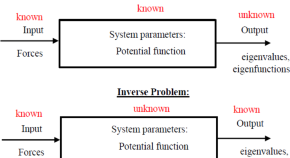
Collection
Machine Learning and Inverse Problems
- Submission status
- Open
- Open for submission from
- 04 August 2023
- Submission deadline
- 30 June 2024
This special issue aims at bringing together articles that discuss recent advances in machine learning and inverse problems. Machine Learning is a subset of Artificial Intelligence focusing on computers’ ability to learn from data and to imitate intelligence human behaviour. A typical inverse problem seeks to find a mathematical model that admits given observational data as an approximate solution. Recent contributions in these areas aim at exploring potential synergies between their two different domains of research. From one hand, in fact, machine learning algorithms can leverage large collections of training data to directly compute regularized reconstructions and estimate unknown parameters. From the other hand, machine learning algorithms can benefit from the vast inverse problem literature and the existing contributions to the theory of inverse problems, and they can be used to simulate boundary value data when they are missing.
Both these domains are of great interest in many application areas, including biomedical engineering and imaging, remote sensing and seismic imaging, astronomy, oceanography, atmospheric sciences and meteorology, chemical engineering and material sciences, computer vision and image processing, ecology, economics, environmental systems, physical systems. The possibility of integrating them can generate more precise estimation and allow to estimate unknown parameters in more complex environments. All papers included in this special issue will consider aspects of numerical analysis, mathematical modelling, and computational methods. This call for papers invites contributions from emerging areas such as quantum inverse problems and quantum machine learning. Potential topics include, but are not limited to, the following:
Deep Learning Algorithms Inverse Problems Techniques Inverse Problems for Ordinary and Differential Equations Optimization Methods in Inverse Problems and Machine Learning Machine Learning Neural Networks Quantum Inverse Problems Quantum Machine Learning Shape Optimization Inverse Optimization Image Analysis Regularization Techniques
Important Dates: Deadline for submissions: November 30, 2023 1st round of review – comments to authors: January 31, 2024 Revision deadline: March, 2024 Submission of final version: June, 2024
Submission Procedure: Please submit to the Optimization and Engineering (OPTE) journal at https://www.springer.com/mathematics/journal/11081 and select special issue “SI: Inverse problems 2023”. All submissions must be original and may not be under review by another publication. Interested authors should consult the journal’s “Instructions for Authors”, at https://www.springer.com/mathematics/journal/11081. All submitted papers will be reviewed on a peer review basis as soon as they are received. Accepted papers will become immediately available at Online First until the complete Special Issue appears.
Editors
-
D. Auroux
Universite’ Cote d’Azur, France
-
V. Kovanis
Virginia Tech, USA
-
H. Kunze
University of Guelph, Canada
-
D. La Torre
SKEMA Business School, France
Articles (2 in this collection)
-

-
Direct and inverse problems of fractional Sturm–Liouville equation
Authors
- Zahra Kavousi Kalashmi
- Hanif Mirzaei
- Kazem Ghanbari
- Content type: Research Article
- Published: 25 March 2024



